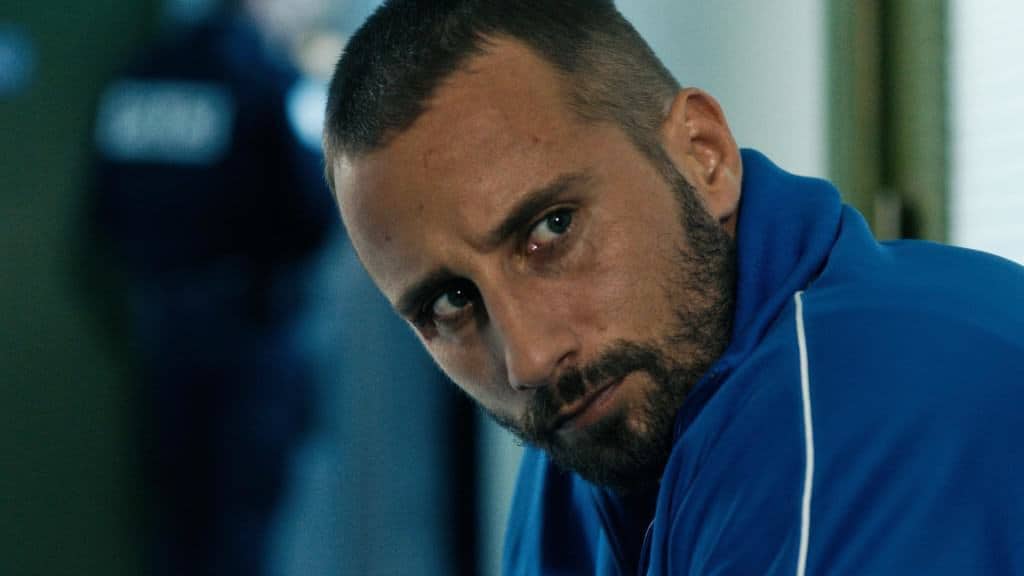Although Alice Winocour’s new film Disorder works as a heartpounding home invasion thriller, it’s also a meditation on trauma, paranoia, class, and unfulfilled desire. Read our interview with Alice Winocour about Disorder and Proxima.

Although Alice Winocour’s Disorder works as a heartpounding home invasion thriller, it’s also a meditation on trauma, paranoia, class, and unfulfilled desire. From the first shot of the film, Winocour places us firmly in the shoes of the protagonist, Vincent (Mattias Schoenaerts, terrific), a French soldier just returned from battle who is having trouble coping with civilian life. With tight closeups set to a blurred background to isolate him completely from the world when he’s panicking and a complex, subjective aural landscape — his war scars include hearing loss and we hear what he hears — we’re already primed for action and intrigue when the reality appears much more sedate.
While on leave, Vincent takes odd jobs, and one night, he ends up as a security guard for a swanky party at the Maryland estate owned by the diplomat Whalid (Percy Kemp). There’s something ominous about the event from the start. As Vincent paces the hallways of the mansion before the party even begins, just getting his bearings, you half expect someone to jump out at him at any moment. His colleagues point out the many blind spots of the security cameras and Vincent seems oddly curious about the house’s owner, using a moment in the security booth to zoom in on and scan the documents lying about on the man’s desk.

Once the party gets going, Vincent finds himself eavesdropping on the guest’s conversations, which we hear in faint fragments: enough to piece together that there’s something not quite Kosher about Whalid whom Vincent spots having clandestine meetings with shady characters. The pounding electronic music and the gyrating bodies of the dancing guests lends a sexual, and even violent, atmosphere to the event. But even as it turns into a dark and stormy night, the most scandalous thing that happens is the host’s wife, Jessie (Diane Kruger), bares her back in her evening dress and we catch Vincent eyeing it in a quiet moment. Was there ever anything really worrisome about the party or is Vincent only capable of assuming he’s got something to fear?
After the party, Vincent’s friend, who organized the security crew, offers him a 48-hour job to babysit the lady of the house and her son while her husband travels. It’s supposed to be an easy task and a lucrative one; Vincent needs cash. Yet from the start, Vincent smells danger. It’s just not clear to him or to us, whether the threat is real or part of his own PTSD from war: he suffers from insomnia, nightmares, panic attacks, concentration difficulties, and aural hallucinations. Is he seeing trouble that isn’t there because he’s so used to living in it or does he have cause for alarm? We do know he’s an intelligent man, who’s been putting together the puzzle of just what is really going on behind closed doors in Whalid’s professional dealings, which definitely aren’t what they seem. But should that matter?

Winocour is constantly playing with our genre expectations, tipping us off to danger with a pulsing score, a stand-in for Vincent’s own constantly racing heart, but undermining Vincent’s judgement at every turn. There’s a subtle way in which he’s treated derisively like the help, as if he has nothing of value to offer but muscle, which makes us question his suspicions. At the party, he’s ordered around to do menial tasks like find Whalid’s wife or get ice for a guest without even a bit of respect. His eavesdropping is so effective because he’s treated like he’s invisible.
In order to protect Jessie, he has to stay at the estate, and he’s given a small, spartan room, so out of place in this lavish house. And there’s a jarring scene after so much time spent with Jessie, when he actually introduces himself and tells her his name: she wasn’t interested before, treating him like a tag-along forced upon her rather than an actual person. Because we only see him belittled and not on the battlefield, we’re not sure if he’s inventing a battlefield where there isn’t one.
Ever the soldier, Vincent is constantly scanning the room, checking for warning signs, and Winocour’s camera follows both his expressions of worry and the path his eyes take through the vicinity. We, too, are on the lookout. Meanwhile, false alarms abound to the point that even Vincent wonders if he’s reaching for something that isn’t there. When trouble does come his way, he’s lethal with a weapon, unafraid to kill in self defense without hesitation: he may be protecting Jessie, but it also makes him seem like a threat, especially given how much he floats in and out of full consciousness. We know he hasn’t left the battlefield behind, but can he tell friend from foe with certainty?
An attraction forms between Vincent and Jessie, especially once he proves indispensable. In a lesser film, he’d earn a tryst with her as a reward for his heroism. In this one, he’ll have to settle for stolen glances at her bare legs in short shorts, a view of her cleavage through the security camera, and reciprocated flirtatious words and gestures. He’s lonely and detached from the world, and Jessie is fodder for fantasy, casting himself as a hero that, for the most part, she doesn’t think she needs, questioning his advice at every turn, standing her ground. It all builds to a final shot where so much has happened, both real and imagined, that we’re not quite sure if it’s a daydream or a happy ending.
This article initially reported the film’s title as Maryland. It has since been changed to Disorder to reflect its English language title. This review was originally published on May 15, 2015 as part of Seventh Row’s 2015 Cannes Film Festival coverage. It has been republished for the film’s U.S. release.
Read more about Alice Winocour…
WATCH: The video and transcript of our masterclass with Winocour >>
READ: Our TIFF interview with Winocour on Proxima >>
READ: Our interview with Winocour on Disorder >>
READ: Alex Heeney on Matthias Schoenaerts, including his performance in Disorder >>


